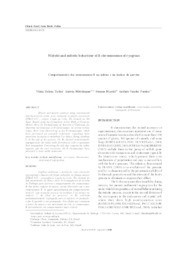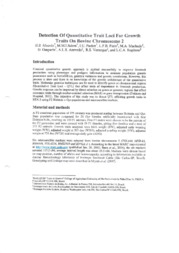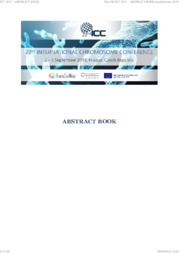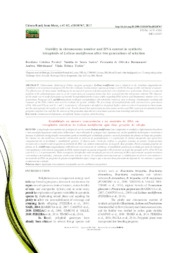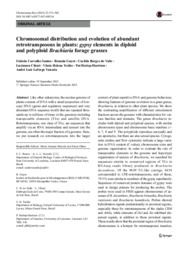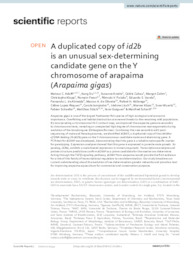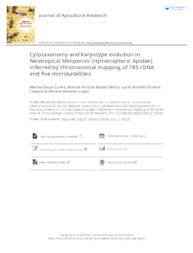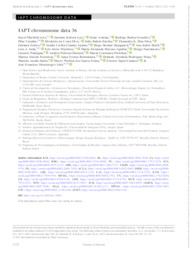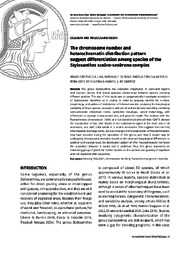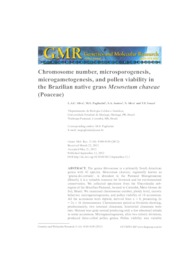Search Publications
Filter by:
| Author(s): TECHIO, V. H.; MITTELMANN, A.; MARCIÓ, S.; PEREIRA, A. V. ABSTRACT - Mitotic and meiotic analyses using conventional and fluorescent stains were employed in plants (accession ETBAZ 055 - origin: Capão do Leão, Rio Grande do Sul State, Brazil) from the Germpl... ... |
| Author(s): MOURÃO, G. B.; SALEM, M. M. I; PACKER, U. I.; PINTO, L. F. B.; MACHADO, M. A.; GASPARIN, G.; AZEVEDO, A. L. S.; VERNEQUE, R. da S.; REGITANO, L. C. de A. Classical quantitative genetic approach is applied successfully to improve livestock production using phenotype and pedigree information to estimate population genetic parameters such as heritabilitie... ... |
| Author(s): SADER M. A.; DIAS, Y.; MUNHOZ, C.; PENHA, H.; AMORIM, B. S.; COSTA, L.; VAIO, M.; SANTOS L. A. C.; DORNELAS, M. C.; BERGES, H.; MELO, N. F. de; SOUZA, G.; VIEIRA, M. L.; PEDROSA-HARAND, A. Passiflora L. has around 500 species mainly distributed in the Neotropics. The genus shows different basic chromosome numbers associated to different subgenus (x = 6, 9 and 12) and high variation in g... ... |
| Author(s): PEREIRA, R. C.; SANTOS, N. de S.; BUSTAMANTE, F. de O.; MITTELMANN, A.; TECHIO, V. H. ABSTRACT - Chromosome doubling of Italian ryegrass genotypes ( Lolium multiflorum Lam.) adapted to the brazilian edaphoclimatic conditions is an important strategy used by breeders and aims to obtain... ... |
| |
| Author(s): ADOLFI, M. C.; DU, K.; KNEITZ, S.; CABAU, C.; ZAHM, M.; KLOPP, C.; FERON, R.; PAIXÃO, R. V.; VARELA, E. S.; O'SULLIVAN, F. L. A.; OLIVEIRA, M. A. de; NÓBREGA, R. H.; LOPEZ-ROQUES, C.; IAMPIETRO, C.; LLUCH, J.; KLOAS, W.; WUERTZ, S.; SCHAEFER, F.; STÖCK, M.; GUIGUEN, Y.; SCHARTL, M. Arapaima gigas is one of the largest freshwater fish species of high ecological and economic importance. Overfishing and habitat destruction are severe threats to the remaining wild populations. By in... ... |
| Author(s): CUNHA, M. S.; GARCIA, M. V. B.; CAMPOS, L. A. O.; LOPES, D. M. The Neotropical Meliponini bees, commonly known as stingless bees, are phylogenetically subdivided into three clades in which the chromosome numbers vary from n 1⁄4 8 to n 1⁄4 17. The goal... ... |
| Author(s): POZZOBON, M. T.; SOUSA, M. W. dos S.; VALLS, J. F. M.
|
| Author(s): LIRA, I. C. S. A.; MELO, N. F. de; ANTONIO, R. P.; OLIVEIRA, R. S. de; QUEIROZ, M. A. The genus Stylosanthes has economic importance in semi-arid regions and requires studies that reveal complex relationships between species involving of Stylosanthes identified as S. scabra, in order t... ... |
| Author(s): SILVA, L. A. C.; PAGLIARINI, M. S.; SANTOS, S. A.; SILVA, N.; SOUZA, V. F. The genus Mesosetum is a primarily South American genus with 42 species. Mesosetum chaseae, regionally known as ?grama-do-cerrado?, is abundant in the Pantanal Matogrossense (Brazil); it is a valuable... ... |
Observation
Some of Embrapa's publications are published as ePub files. To read them, use or download one of the following free software options to your computer or mobile device. Android: Google Play Books; IOS: iBooks; Windows and Linux: Calibre.
Access other publications
Access the Agricultural Research Database (BDPA) to consult Embrapa's full library collection and records.
Visit Embrapa Bookstore to purchase books and other publications sold by Embrapa.

